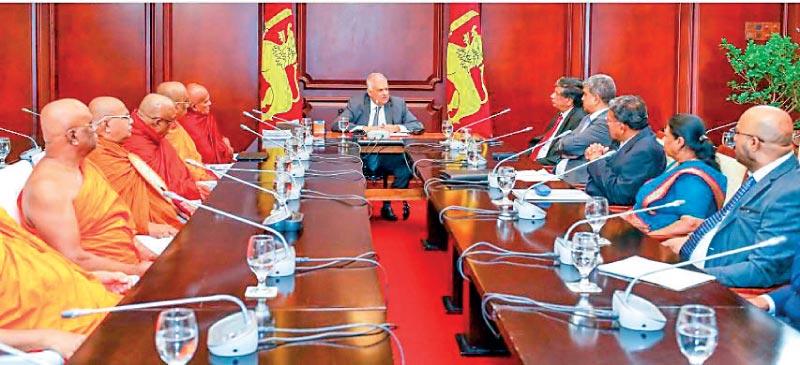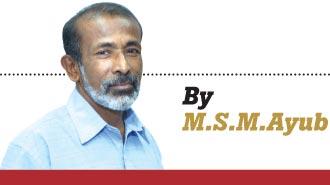Truth About Truth Seeking

GTF meets Sri Lankan President and signs joint declaration with Buddhist monks
 Last week saw two important events in respect of reconciliation among various communities in Sri Lanka. In one of them, several members of the Global Tamil Forum (GTF), a group from the Tamil diaspora and a group of leading Buddhist monks, met President Ranil Wickremesinghe and the Mahanayake Theras of the Malwatta and Asgiriya Chapters on December 8, and handed over a document called “Himalaya Declaration.”
Last week saw two important events in respect of reconciliation among various communities in Sri Lanka. In one of them, several members of the Global Tamil Forum (GTF), a group from the Tamil diaspora and a group of leading Buddhist monks, met President Ranil Wickremesinghe and the Mahanayake Theras of the Malwatta and Asgiriya Chapters on December 8, and handed over a document called “Himalaya Declaration.”
The document with highly generalised six points promoting reconciliation had also been released to the public on the same day in Kandy. The GTF members including Suren Surenthiran who is well known in Sri Lanka and the monks from the organization called ‘Sangha for a Better Sri Lanka’ had met in the Himalayan Kingdom of Nepal in April this year and prepared the document, and thus it was named “Himalaya Declaration.”
On the same day, the President’s Media Division in a statement announced that the government has taken steps to establish a Truth Seeking Commission. “In a historic step towards transitional justice and post-conflict reconciliation, the Government of Sri Lanka has decided to establish an independent Commission for Truth, Unity and Reconciliation,” it stated.
It was not clear if the two incidents – the handing over of the Himalaya Declaration to the President and the announcement of the Truth Commission taking place on the same day – was merely a coincidence or prearranged.
However, the significance of the GTF meeting with the President seems to be symbolic and no bearing on the political trajectory owing to the over-generalisation of the document they had presented to the President, and the fact that no follow up action seems to be at least meant. And the meeting was not welcomed by the Tamil groups here and abroad either.
Some overseas Tamil groups had stated that the GTF was a group representing a small segment of the Sri Lankan Tamil Diaspora and they have no right to represent all those Tamils migrated to various countries. Similarly, local Tamil parties and groups also did not see the meeting as a welcome move.
In fact, it is commendable if the government – with a deeper sense of responsibility – is committed to seeking the truth about past incidents that negatively impacted on national unity. Yet, the past experience on so-called reconciliation moves in general and truth seeking about the past in particular cannot but push us into pessimism.
The statement by the President’s Media Division says, “A key objective of this process is to establish the truth regarding post-conflict grievances of Sri Lankan citizens, facilitating reconciliation, reparation and sustainable peace.” In the same paragraph it also says “The proposed Commission acknowledges every Sri Lankan’s inalienable right to ascertain the truth, a pivotal aspect for individuals and communities to heal from past conflicts.” The question that begs answers is how a commission that is meant for truth regarding “post-conflict grievances” can serve to heal the effects of “past conflicts.”
It further observes, “The Commission is expected to review, consider and facilitate the implementation of recommendations made by past Commissions, including the Lessons Learnt and Reconciliation Commission (LLRC).”It must be recalled that former President Gotabaya Rajapaksa had appointed a Commission in 2021 under the chairmanship of Supreme Court Judge, A.H.M.D. Nawaz for the same purpose, and a synopsis of the recommendations in the draft final report of that Commission was also handed over to President Ranil Wickremesinghe, on February 06 this year.
Then, why is the proposed Truth Commission also going to “consider and facilitate the implementation of recommendations made by past Commissions”? Has the Navaz Commission report also met the same fate as those of so many other past commissions on reconciliation? This is an interesting situation. One government appoints so many commissions with so many names claiming to bring about reconciliation, and dumps their reports. Later, another government appoints another commission to review those reports and make fresh recommendations. And a third government, forgetting or ignoring the previous commission appoints another commission to do the same thing, among others.
As far as the Truth Commissions are concerned, this is not the first effort made in the country. It has been attempted before, but only to be abandoned and forgotten. The idea was mooted in 2015 under the premiership of Mr. Ranil Wickremesinghe during the so-called Yahapalana Government. The Foreign Minister of that government, Mangala Samaraweera told the UNHRC on September 14, 2015 that his country was launching a truth and reconciliation commission after its decades-long civil war. Again on February 28, 2017 he told the 34th Session of the UNHRC that the Sri Lankan Government expected a draft legislation on a Truth-Seeking Commission to be presented to the Cabinet within the next two months.
However, not within two months but after about 20 months, on October 16, 2018, a conceptual framework was submitted to the cabinet which said the Truth Commission will look into the grievances suffered by the people during any phase of civil disturbances, political unrest or armed conflict that has occurred in the past.
Yet, it did not materialise, nothing was done for over four years until January this year when the Cabinet approved another concept of a Truth and Reconciliation mechanism as proposed by the Cabinet Sub-Committee on Reconciliation, which was chaired by Wickremesinghe who was this time the President of the country. Meanwhile, emphasizing the need to strengthen the institutional capacity for reconciliation, the synopsis of recommendations of the Navaz Commission, also referred to as Truth and Reconciliation Commission, whose contours it said will be set out in due course when the Final Report is submitted.
As a follow up step of this concept paper, Foreign Minister Ali Sabry and Justice Minister Wijeyadasa Rajapakshe took a five-day visit to South Africa in March, to further study the subject. Nine months after that, the President’s Media Division has now announced that the government has decided to establish an independent Commission for Truth, Unity and Reconciliation.
Hence, the lack of consistency and the haphazardness in the process is clear and they fail to instill confidence of the political will of the leaders into the people, especially those affected most by the three-decade long ethnic conflict. And it was at a time when the Constitutional Council and the Independent Commissions that were meant for the clipping of the wings of the Executive were challenged by the very Executive that the President’s Media Division had stated “The Government is committed to ensuring that the proposed Independent Commissions act impartially and free from any political influence.
The division among the people on transitional justice and particularly on retributive justice and restorative justice is so deep that the debate has been dragged for over 14 long years after the end of the war, pushing the country to square one over and over again, in this matter. The protracting debate has made truth seeking further difficult due to the gradual loss of evidence and witnesses. Besides, the pressing problem is that we do not have national icons like Nelson Mandela and Bishop Desmond Tutu of South Africa. Praying for one is the only option left.






